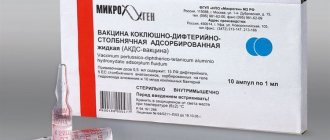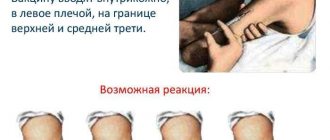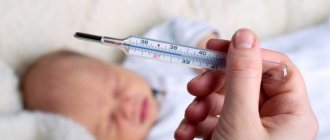WHAT IS THE DIPHTHERIA VACCINATION?
The diphtheria vaccine, unlike many other vaccines, does not contain live and weakened microorganisms. To acquire stable immunity, a specially treated pathogen toxin is injected subcutaneously. After this, the body begins to actively produce antibodies in the form of antitoxins. These substances provide a person with immunity to the diphtheria bacillus. The effect of the vaccine lasts about 10 years, then revaccination is necessary.
Diphtheria toxoid is used as a component in complex vaccines ADS (without the pertussis component) and DTP (whooping cough, diphtheria, tetanus antitoxins).
Children of the first year of life, preschoolers and schoolchildren are subject to mandatory vaccination, since the child’s body is especially susceptible to the negative effects of this infection.
For adults, routine vaccinations are provided, which should be carried out every 10 years, but more often vaccinations are postponed or completely abandoned.
Population groups that are subject to mandatory vaccination:
- medical workers;
- catering establishment staff;
- people working in preschool and school educational institutions;
- persons living in a region with an unfavorable epidemic situation.
The first revaccination is usually carried out between 18 and 27 years, the second - between the ages of 28 and 37, etc.
Vaccination schedule
Vaccination against diphtheria is carried out in courses. After the initial three doses of the drug are administered, the body becomes temporarily immune to this infection. To increase the duration of action of vaccinations, additional booster doses of the vaccine are administered according to a specific schedule.
According to the National Vaccination Calendar, the timing of such preventive work is determined:
- first vaccination at the age of 3 months;
- the second – 45 days after the start of the course;
- the third with the same interval after the second;
- at one and a half years the first revaccination is carried out, which prolongs the effect of the initial vaccinations;
- the next injections of vaccines are at 6-7, at 16, and so on every 10 years.
If a child was not vaccinated for health reasons in childhood, then initial vaccination for adults begins according to the same scheme as for children.
The channel of Elena Malysheva talks in detail about diphtheria and vaccination.
CONTRAINDICATIONS TO DIPHTHERIA VACCINATION
Even in a healthy adult, the diphtheria vaccine can cause a reaction, so before the procedure, the doctor examines and questions the patient about contraindications to the vaccine.
Conditional contraindications:
WHO indicates the need to vaccinate even pregnant women after the 12th week of pregnancy. Anatoxin will not harm the fetus, but will provide the newborn with protection in the first 3 months of life.
A reaction to diphtheria vaccination in adults is rare. However, for some time after the procedure it is recommended to avoid crowded places, avoid exposure to high temperatures, get more rest, and do not overindulge in food and alcoholic beverages.
Contraindications to vaccine administration
It is known that no special preparation is required before vaccination. Immunization can be temporarily canceled by the doctor's decision if the following contraindications are present:
- pregnancy or lactation;
- a history of dysfunction of the urinary system and liver;
- relapse of a chronic disease;
- diabetes;
- undergoing a course of oncological chemotherapy;
- exacerbation of an allergic reaction of any etiology.
The absolute abolition of anti-diphtheria vaccination includes the presence of diseases such as AIDS in the patient, individual intolerance to the drug and the presence of serious pathologies of the central nervous system.
The vaccine is not recommended to be administered if the integrity of the ampoule is damaged, the necessary markings are missing, or after the expiration date indicated on the package.
SIDE EFFECTS AFTER DIPHTHERIA VACCINATION
In adults, side effects from vaccination are rare.
No cases of severe allergies or neurological disorders were recorded.
Possible consequences of diphtheria vaccination:
- pain and swelling at the injection site;
- enlargement of regional axillary lymph nodes;
- fever;
- irritability, manifestation of aggression;
- fatigue and apathy;
- decreased appetite.
Fever on the first day after injection is considered normal. The temperature can be brought down with medications that are used for colds. If you feel unwell for more than a week, it is better to consult a doctor.
Reaction to the drug
Diphtheria vaccine is a low-reactogenic drug. Most often, local reactions occur at the injection site, where inflammation begins. The lump that forms at the injection site is very painful. The pain persists as long as inflammation exists and stops when all the drug is absorbed.
There may also be unpleasant symptoms, such as:
- slight increase in temperature;
- lethargy;
- drowsiness;
- general malaise.
But they are mild and go away within a few days.
COMPLICATIONS AFTER DIPHTHERIA VACCINATION IN ADULTS
If these rules are observed in adults, side effects of diphtheria vaccination in the form of complications are rarely recorded. It happens that it is impossible to identify a predisposition to such a reaction and predict the outcome.
Sometimes side effects from vaccination are accompanied by angioedema, an attack of anaphylactic shock, diarrhea and vomiting.
Possible complications of vaccination:
- Anaphylactic shock
occurs in persons predisposed to allergic reactions or in patients with bronchial asthma. - Increase in
body temperature to critical levels. - Abscess
at the needle insertion site. - Cardiac complications ( tachycardia, arrhythmia
). - Convulsions
.
If an acute allergic reaction to the first vaccination is detected, subsequent stages of vaccination are not carried out.
Vaccination against diphtheria does not eliminate the risk of infection, but the disease in this case will be much milder than in an unvaccinated person.
Found a mistake? Select it and press Ctrl + Enter
Diphtheria is a disease from a number of infectious diseases, which is characterized by inflammation of the oropharynx and nasopharynx (in more rare cases - inflammation.
source
Minuses
- Specific immunity. Newborns have an immature immune system, and for this reason, breastfeeding is necessary for the first year of life so that the baby receives the necessary antibodies from the mother. Immunity will be fully formed only at the age of 5-7 years. Thus, it turns out that vaccination at an early age can affect his health in the future. Many people refuse vaccination for this reason. The vaccine itself will have an effect only in the near future after it is administered. It will allow you to obtain specific immunity only for a while, and will weaken the general immunity during this period.
- Adverse reactions. Vaccination against diphtheria (complex DTP) is considered the most difficult to tolerate in childhood. The peak of adverse reactions occurs on the 3rd or 4th administration of the vaccine, which coincides with the peak rates of immune development. The most common reactions observed are: increased body temperature, pain at the injection site, mild malaise, redness at the injection site, and ephemeral rashes. Each child tolerates this vaccine individually; some may have reactions to it, while others may not. On average, it is noted that adverse reactions after vaccination against diphtheria are observed in 20% of vaccinated people. All side effects develop within the first 72 hours from the moment the vaccine is administered and last no more than 48 hours. Treatment in this case is not required.
- The vaccine does not provide 100% protection. Even after vaccination against diphtheria, the risk of contracting this infection still remains. It is worth considering that the disease will not be severe, and protecting the child in at least some accessible way is better than if he is not protected at all.
- Severe complications. In addition to general reactions to the vaccine, there is always the possibility of more severe ones, which, due to their rare occurrence, cannot be completely excluded. These include: convulsions, neurological reactions, anaphylactic shock.
- Psychological moments. For a child, any vaccination is a little stressful. After the injection is administered, the baby does not understand that this is a necessary measure to protect his body from a dangerous infection, and begins to cry. Many parents find this difficult to bear on a psychological level, as is the child himself.
Diphtheria vaccine - side effects in adults
Diphtheria vaccination involves administering a toxin contained in the causative agent of the disease, which causes the production of specific antibodies and subsequently immunity to the disease. In most cases, the diphtheria vaccine is given in childhood, but its effect weakens over time, so adults may need a booster shot to maintain immunity to the disease.
Side effects after diphtheria vaccination in adults
Diphtheria is rarely vaccinated separately. Typically, complex vaccines DPT (diphtheria and tetanus) or DTP (whooping cough, diphtheria, tetanus) are used for vaccinations. The choice of vaccine type depends on the presence of an allergy to one or another component, since allergic reactions to the vaccine or any of its components are not so rare.
The graft is made into the shoulder muscle or the area under the shoulder blade. In addition to allergic manifestations, after diphtheria vaccination in adults, the following side effects (mostly temporary) may be observed:
- increased body temperature (up to 37.5°C, rarely higher);
- increased sweating;
- general weakness and feeling of malaise for the first 2-3 days after vaccination;
- indigestion, nausea, loose stools;
- pain at the injection site;
- redness, hardness and swelling at the injection site;
- runny nose;
- otitis and pharyngitis.
As a rule, such side effects are short-lived and disappear within 3-5 days after diphtheria vaccination or respond well to treatment. In exceptional cases, after vaccination against diphtheria, severe side effects may occur in the form of muscle pain, spasms, temporary limitation of mobility and atrophy in the injection area.
Complications after diphtheria vaccination in adults
In general, diphtheria vaccination in adults is considered safe and does not lead to significant complications if precautions are followed.
The most dangerous and frequent complication after such a vaccination is an acute allergic reaction, up to
anaphylactic shock, especially in people prone to allergic manifestations and patients with bronchial asthma.
In addition, in rare cases, a significant increase in temperature (up to 40°C), the development of heart complications (tachycardia, arrhythmia), and the occurrence of seizures are possible.
As a local complication, an abscess may develop at the site of vaccine administration.
To reduce the risk of complications, vaccinations should not be carried out for at least a month after suffering from acute respiratory viral infection or any infectious disease. In case of an allergic reaction, repeated administration of the vaccine is contraindicated.
source
The effect of the diphtheria vaccine on the body
Drugs are developed in laboratories. As a rule, these are multivalent drugs that are aimed at combating several diseases. The most famous are AKDS, ADS-M, ADS. There are a number of foreign analogues. What these drugs have in common is that they help develop immunity not against the pathogenic bacterium, but against the toxin that it secretes. Of course, the toxin in the vaccine is weakened and neutralized, but it is rarely possible to completely avoid temporary negative effects on the body. The diphtheria vaccine does not cause side effects in adults as often as in children, but such situations still occur.
The temperature after diphtheria vaccination is a sign that the vaccine is working and the body is fighting. In the first days, it may not be high, but it can rise to 39. Taking an antipyretic is acceptable if the thermometer reaches 38.5. Some of the proven and reliable drugs are paracetamol and ibuprofen. Many people consider paracetamol to be a weak medicine, because... They don’t know how to calculate the dose. Remember that for an adult, its dose should be at least 500 mg. The calculation rule for children is 10 mg/kg body weight.
Headache, this may be a negative effect of the vaccine. You need to be patient, the condition will disappear on its own within a week. General weakness, aches, nervousness - all this is a normal reaction in this case.
My arm hurts from the diphtheria vaccine. This is due to the fact that the medicine is absorbed gradually. The process takes at least a week. If the drug had immediately entered the body, it would have been quickly destroyed, and immunity would not have had time to form. The skin where the medicine is located swells and turns red. It hurts to touch it, it hurts to move your hand. After the medicine is absorbed, the symptoms disappear. If you can’t stand it, you can take painkillers (paracetamol, analgin, etc.). A warm compress is also effective. If you apply a leaf of white cabbage to the sore shoulder at night, the process of resorption of the drug will go faster. A lump after diphtheria vaccination is formed when the drug contains an anti-whooping cough component (DPT), which is the most difficult to tolerate. Since whooping cough is a childhood disease, adults are not given this vaccine. Back pain after vaccination if the injection was given under the shoulder blade. In this case, it is convenient to heat a towel on the radiator (if it is winter) or with an iron, spread it on the bed, lie on top, cover yourself and try to fall asleep. The procedure gives a good result, but it can only be carried out if there is no high temperature.
An allergic reaction can be expressed as anaphylactic shock. But the vaccine against diphtheria practically does not cause it. Another fairly rare reaction is urticaria (rash). Basically, allergies are expressed in the form of irritation at the injection site. Under no circumstances should you scratch it, no matter how irresistible the desire may be. Dirty hands can infect the skin, leading to an abscess.
What is diphtheria
Diphtheria is a dangerous infectious disease, the development of which is provoked by the diphtheria bacillus. At the site of pathogen penetration, a fibrous film is formed, and the inflammatory process begins.
Due to the penetration of exotoxin into the blood, general intoxication is observed, leading to serious complications.
The infection is transmitted by airborne droplets. The source of infection is a patient with diphtheria or a carrier of it.
Most often, the oropharynx is affected, but sometimes the trachea, nose, larynx, and respiratory tract. Rarely, the pathogen affects the ears, genitals, eyes, and skin.
Pathology leads to the development of complications. Negative changes are observed in the peripheral nervous and cardiovascular systems. Nephrotic kidney syndrome is also possible.
What is diphtheria
Diphtheria is an infectious disease caused by Loeffler's bacillus from the genus Corynebacterium. The disease is transmitted by airborne droplets and mainly affects the respiratory system, but the skin and mucous membranes of the eyes can also be affected; against the background of the pathology, the functioning of the nervous and reproductive systems often deteriorates.
Why is diphtheria dangerous?
- diseases of the nervous system develop - paralysis of the respiratory tract, upper and lower extremities, muscles, vocal cords;
- myocarditis - an inflammatory process in the tissues of the heart muscle;
- paralysis of the respiratory muscles can be fatal.
Other complications of diphtheria are otitis media, pneumonia, heart failure, abscess, toxic nephrosis.
Bacillus Loefflera from the genus Corynebacterium is the causative agent of diphtheria.
Is it necessary to vaccinate?
Vaccination against diphtheria is the only effective way to protect against a disease that can lead to death. Previously, this pathology was classified as a group of childhood diseases, but now the infection affects adults. Diphtheria is often diagnosed in people 20-40 years old .
Antibiotics and other medications are ineffective against diphtheria bacillus. These drugs are used in conjunction with serum designed to build immunity.
It is best to vaccinate early to prevent infection.
When talking about whether vaccinations are necessary, doctors say unequivocally - yes. This is the only way to develop immunity that can protect against the penetration of bacteria.
What kind of disease is this?
Diphtheria is caused by bacteria - some strains of the bacillus of the same name, which secrete a powerful poison - diphtheria endotoxin, which in its aggressiveness and danger surpasses even botulinum and tetanus toxins, which are considered extremely poisonous.
You can become infected from people who are already sick and from carriers who secrete the bacillus through the nasopharynx. Carriers are even more dangerous than patients, because they outwardly look completely healthy and there are always many more of them: diphtheria bacteria carriage is registered in 10-30 percent of people living around us.
Despite its high contagiousness, the disease is well controlled: vaccination against diphtheria for several years helps the body produce antibodies and form lasting immunity.
Types of vaccines used
Immunization of the adult population is carried out through the use of complex medications that prevent the development of diphtheria and other pathologies.
The most commonly used drugs are ADS-M Anatoxin (domestic production), Imovax DT Adult (manufactured in France). The drugs contain tetanus and diphtheria toxoids.
Tetracok solution can also be used. It is designed to protect against diphtheria and polio. The medicine is produced using a special technology and undergoes several stages of purification. Therefore it is considered safe.
The monovaccine AD-M Anatoxin is rarely used. It promotes the development of immunity only against diphtheria.
How children are vaccinated
Immunization of children is carried out in several stages and includes the actual vaccination and several revaccinations to maintain immunity to infection.
Vaccination
The first vaccination against diphtheria is given to children at three months, and immunization is carried out in three stages with an interval of 30-45 days.
Revaccination of children who have not been ill or who have been ill
As mentioned above, revaccination begins 9-12 months after the full course of immunization, then at 7, 11 and 16 years old in the usual manner, if the child has not had diphtheria during this time.
If infection does occur and the disease proceeds without complications, additional vaccination against diphtheria is not required. The situation is different with vaccinated children who have suffered toxic forms of the disease. They receive additional vaccination six months after recovery - they are administered the drug ADS-M at a dose of 0.5 once. Further revaccinations are recommended according to age and national calendar.
If the child is unvaccinated and gets sick
In unvaccinated children, an attack of diphtheria infection of any form is considered the first vaccination, since those who have recovered develop stable natural immunity to the pathogen. If before the illness the child managed to receive only one vaccination, then the illness is considered a second vaccination.
Restrictions after drug administration
After vaccination, it is extremely important to follow all medical recommendations.
- visit crowded places for several days;
- overeat for three days (semi-starvation is recommended);
- eat exotic fruits, unfamiliar foods, sweets, spices, pickles, spicy dishes for 2-3 days;
- visit baths, saunas, swimming pools for a week;
- drink alcohol for three days;
- wet the injection site on the first day.
Exercising after drug administration
Physical activity after vaccination is not recommended. Sports should be postponed for a week. After this time, it will be possible to return to the usual rhythm of life.
When to delay or even refuse vaccination
It is necessary to distinguish between recommendations for vaccination and revaccination. The first diphtheria vaccination may be delayed if there are time restrictions on its administration, or completely canceled in some cases.
Temporary contraindications
Vaccination will have to be rescheduled if your baby has:
- Any acute infectious diseases at the time of invitation for vaccination
- Exacerbation phase of chronic, systemic and autoimmune diseases
A child who has recovered from a mild cold can be vaccinated within two weeks. For chronic diseases, you must first achieve a stable remission lasting at least a month, and then vaccinate against diphtheria.
Absolute contraindications
The local pediatrician and specialized specialists give a complete ban on vaccination to children who are diagnosed with:
- Progressive diseases of the central nervous system
- Encephalitis
- Malignant oncopathologies of hematopoietic organs, liver, kidneys, brain
- Convulsive syndrome
- Serum sickness
- Previously reported cases of anaphylactic shock, angioedema, urticaria
Slightly different recommendations are given on restrictions and contraindications for diphtheria vaccinations for children, adolescents and adults when it is time for revaccination.
Since injections are made with drugs with a reduced content of toxoid and have a gentler effect on the body, there are no significant restrictions on their use.
The only exceptions are decompensated forms of chronic diseases that do not respond to treatment:
- Diabetes
- Neurological pathologies – myasthenia gravis, multiple sclerosis
- Systemic diseases
Vaccination against diphtheria during revaccination is indicated for patients with any form of immunodeficiency. Allergy sufferers can also be vaccinated against the background of desensitizing therapy.
Side effects
The reaction to vaccination is usually mild. The following side effects are sometimes observed:
- slight rise in temperature;
- redness, hardening of the injection site;
- runny nose;
- cough;
- sore throat;
- diarrhea;
- gagging;
- nausea;
- rashes;
- weakness;
- apathy;
- irritability;
- excessive sweating;
- headache.
Such symptoms disappear on their own after three days. There is no reason to worry. This is a normal reaction of the body to the administered drug.
How adults are vaccinated
There is no special vaccination schedule for diphtheria for adults, but the entire adult population of the country must be vaccinated every five years until the age of fifty-six. Invitations for immunization can be obtained from your local physician.
Adults are vaccinated with ADS-M. If during the period between vaccinations they become ill with a mild form of diphtheria, they are not prescribed an additional diphtheria vaccination.
The exception is for those who have recovered from toxic forms: they, like children, six months after recovery are prescribed another vaccination at a dose of 0.5, and they skip the next campaign. They receive a new vaccination every 10 years.
Important! There is a separate group of adults who should be vaccinated regularly and mandatory. These are employees in the fields of education, medicine and services. The vaccination record is entered in their medical records.
Due to increased migration within the country and long-term evasion of vaccination by a large part of the population, a significant number of people with an unknown vaccination history have appeared. Before sending them immediately for vaccination against diphtheria, a serological blood test for antitoxic antibodies is first performed. If the results do not determine sufficient protective titers, such people are immunized.
Complications
Complications rarely develop in the post-vaccination period. As a rule, they are observed when existing contraindications are neglected, the rules for administering the drug, and medical recommendations are not followed.
The following consequences of immunization are possible:
- hives;
- Quincke's edema;
- bronchitis;
- laryngitis;
- rhinitis;
- polymorphic exudative erythema;
- anaphylactic shock;
- hyperthermia;
- fever;
- collapsed state;
- loss of consciousness;
- cardiac, respiratory failure;
- decreased muscle tone;
- otitis;
- eczema;
- diathesis;
- dermatitis;
- increased intracranial pressure;
- convulsive syndrome;
- brachial nerve neuritis;
- encephalitis.
If such changes occur, immediate medical attention is needed. Only with timely consultation with a doctor will it be possible to normalize the condition and avoid serious consequences.
Temperature rose after vaccination
The temperature may rise within 24 hours after the procedure. Such changes do not cause concern. This is a normal reaction to the vaccine.
It is worth noting that changing the thermometer readings does not in any way help the development of immunity.
The temperature needs to be brought down .
Antipyretics based on ibuprofen and paracetamol are used. If an increase in temperature is observed more than two days after vaccination, then the symptoms cannot be regarded as a reaction to the vaccine. This is a symptom of another disease. This condition has nothing to do with immunization. You need to seek help from a therapist.
Lump at the injection site
A lump formed at the injection site of the drug is noted when the injection is placed under the skin (the instructions suggest performing the injection intramuscularly). Absorption into the blood slows down. Therefore, a tubercle appears at the injection site.
No therapeutic measures are needed. After a month, the lump will resolve on its own. You just have to make sure that the affected area is always clean. When infection penetrates, a purulent process may begin.
Allergy to vaccination
An allergic reaction to the vaccine is rare. Most often, a rash appears on the skin. Quincke's edema is also possible. Often manifestations of allergies include bronchitis, rhinitis, and laryngitis. Such changes appear within five days after the injection.
An extremely dangerous, rare complication of an allergic nature is anaphylactic shock.
It is observed in people with hypersensitivity to the components of the drug .
It appears on the first day after vaccination. To avoid such complications, it is recommended to take antihistamines five days before vaccination and three days after it.
The injection site is swollen
Swelling of the affected area is often noted. Its occurrence is due to a local inflammatory process.
Unpleasant symptoms disappear when the medication is completely absorbed into the bloodstream. If there is no pain or discomfort, there is no need to worry. A week later the condition returns to normal.
The vaccine started to hurt
The formation of local inflammation is noted at the injection site.
Pain syndrome is a natural reaction that occurs to inflammation. The persistence of these symptoms will be observed until the medication is completely absorbed into the blood (about seven days). Non-steroidal anti-inflammatory drugs will help reduce the severity of symptoms.
The most commonly used are the following:
Contraindications
A period of ill health is undesirable for vaccination. Even if only a runny nose or a cold has affected the body. It is also strictly forbidden to give injections to people allergic to substances from the vaccine. Also pregnancy up to 12 weeks.
Is the body completely protected after vaccination?
No vaccine or injection can guarantee that a person will not get diphtheria. Vaccination greatly reduces the risk of infection - up to 100%. It all depends on the characteristics of the body and the support of the immune system.
Pregnancy as a reason to cancel vaccination
The World Health Organization notes that pregnancy is not an obstacle to vaccination. Unless the pregnant woman has inherited contraindications. After vaccination against diphtheria, the baby will be born with protection against infection for the first months of life, just up to 3 months of age.
Neither the child nor the mother will become infected, because the injection contains only antitoxin. But the pregnancy must last more than 12 weeks. Because there is no time much more dangerous for medical intervention than pregnancy during the period of fetal formation.
How to care for the injection site
Children often confuse injections and are afraid to wet or touch the place where the drug was injected, as when handling Mantoux tests. The diphtheria vaccine has no restrictions on contact with the injection site. But still, it is better to avoid intense influences: friction, scratching, hot water with salt when bathing, etc. This will make it possible to avoid the appearance of external reactions on the skin.
Body reactions after vaccination
The effects that vaccination can cause are quite varied, but do not be alarmed. This is the body's natural reaction and fight against an unfamiliar substance in the body. So, when symptoms appear, keep the patient at rest. If you suspect complications or side effects, it would be a good idea to visit your doctor. Especially if a woman is pregnant, regardless of the term.
Possible reactions:
General poor health. It looks like a cold or loss of strength. The patient wants to sleep, noticeably passive behavior. The condition can last a maximum of a week. If the number of symptoms is rapidly increasing, then you cannot be against a visit to the clinic. Pain, swelling, hardness at the injection site. There is also no reason to worry. In a week, the drug will completely leave the injection site and at the same time the discomfort in this area will disappear. Increased body temperature. It happens that a similar symptom appears within a day. Reduce the fever with the usual medications you use for colds. But if the temperature appeared within a short period of time after the injection, then find out with the doctor what could have caused this condition.
Complications and consequences of vaccination
So far, in the entire history of vaccination against diphtheria, no cases similar to complications have been recorded. The most significant effects of manifestation are undiagnosed allergies to the drug, which are effectively managed by doctors. Or an injection administered into a child’s body during diathesis and similar diagnoses. This should be attributed to non-compliance with contraindications, and not complications.
Temperature after vaccination. Maybe someone will find the article useful.
When does a child develop a fever after vaccination?
What should you do? A rise in temperature (hyperthermia) in a child no higher than 38.5oC after vaccination is a normal reaction of the child’s body. Hyperthermia is due to the fact that the immune system, during the process of neutralizing the vaccine antigen and developing immunity to infection, releases special pyrogenic substances, which lead to an increase in body temperature. That is why there is an opinion that the temperature after vaccination is URGENT. is a guarantee that the child will develop excellent immunity to infection. The vaccine contains microbial antigens, which can be in the form of whole but killed microorganisms, live and weakened, or parts thereof. Each pathogenic microorganism has its own properties, and the child also has individual qualities. It is the properties of vaccine antigens and the individual qualities of the child that determine the presence of a temperature reaction to vaccination. There may be a more pronounced reaction to some types of vaccinations, and less to others. Also, the rise in temperature after vaccination depends on the purity, degree of purification and properties of the vaccine. For example, DTP is a reactogenic drug because it often causes fever. At the same time, there are vaccines that contain the pertussis component in a cell-free form (for example, Infanrix). Such vaccines are much less likely to cause fever compared to conventional DTP. Therefore, if a child is prone to developing a temperature reaction to vaccination, then, if financially possible, it is better to purchase purified vaccines with reduced reactogenicity. Such vaccines will not be offered to you at the clinic, since a cheaper option is purchased at public expense for vaccinations for children. These cheaper vaccines, available in clinics, are as effective as more expensive ones, but they are more likely to cause fever. Hyperthermia after vaccination is a normal condition of the child, which indicates the active formation of immunity. But if the temperature does not rise after vaccination, then this is not a reason to assume that the child’s immunity has not developed. This is a purely individual reaction, which depends both on the vaccine and on the qualities of the child. Sometimes hyperthermia occurs if a child develops a scar at the site where the vaccine was administered, which festers and becomes inflamed. In this case, it is necessary to eliminate the inflammation at the injection site, and the temperature will normalize on its own. How long does it take for the temperature to rise after vaccination? If you have been vaccinated, the vaccine of which contains weakened particles of microorganisms (this is DTP, ADS, against hepatitis B), then the temperature may rise within two days after the injection. Typically, such hyperthermia goes away on its own and does not require special treatment. After DTP vaccination, it can last for 5 days, but this is a normal reaction of the child’s body. If the vaccination was given with a vaccine with live but weakened microorganisms (for example, against polio, measles, rubella or mumps), then the temperature may rise several days after the injection, most often on the 7th - 10th day.
What vaccinations most often cause fever?
Since vaccinations have different reactogenicity (the ability to cause a response in the body), the likelihood of a rise in temperature depends on the type of vaccine that is administered to the child. So, how often do vaccinations from the calendar cause a rise in temperature in a child: Against hepatitis B - very rarely, the vaccine has low reactogenicity. BCG vaccine – some children experience hyperthermia. When the injection site or crust becomes suppurated, the temperature almost always rises. The polio vaccine almost never happens, since the vaccine has extremely low reactogenicity. The DTP vaccine causes a rise in temperature quite often. This vaccine has the highest reactogenicity among others required for children, according to the national vaccination schedule. Against mumps (mumps) – the temperature rises in rare cases. Against rubella - hyperthermia is a relatively rare phenomenon. Against measles - this vaccination usually passes without any reactions. But some children may experience hyperthermia, several days after vaccination. Physiological temperature remains no longer than two days. The above-described reactions in the form of hyperthermia in response to vaccination are normal, that is, physiological. If a child's temperature rises above 39oC, you should consult a doctor. How high can she go? After vaccination, it is possible to develop a weak, moderate or strong reaction to the vaccine. A weak reaction to the vaccine is expressed in an increase in temperature to a maximum of 37.5oC and mild malaise. The average reaction to the vaccine is an increase in temperature in the range of 37.5 - 38.5oC, combined with a deterioration in general condition. A strong reaction manifests itself in a significant increase in body temperature above 38.5oC with serious impairment of the child’s condition. In rare cases, the DTP vaccine can provoke a rise in temperature even up to 40oC, which stubbornly persists for two to three days, despite attempts to lower it with the help of medications. In such a situation, the following vaccinations are administered without the pertussis component, continuing to vaccinate the child only against diphtheria and tetanus (DT). In the case of DTP, a temperature reaction can develop after any vaccination. Some children have the strongest reaction to the initial dose of the vaccine, while others have the strongest reaction to the third dose.
How to behave after vaccination?
Complete formation of immunity to infection after vaccination occurs within 21 days, so the child’s condition should be monitored for two weeks after vaccination. Let's look at what needs to be done at various times after the vaccine is administered, and what to pay attention to: The first day after the vaccine is administered. Usually, it is during this period that most temperature reactions develop. The most reactogenic is the DTP vaccine. Therefore, after the DTP vaccination, before bedtime at night at a body temperature not exceeding 38oC, and even against a background of normal temperature, it is necessary to give the child a suppository with paracetamol (for example, Panadol, Efferalgan, Tylenol and others) or ibuprofen. If the child’s temperature rises above 38.5oC, then it is necessary to give antipyretic drugs with paracetamol in the form of syrup, and analgin. Analgin is given in half or a third of the tablet. If the temperature does not decrease, stop giving your child antipyretics and call a doctor. To relieve hyperthermia, Aspirin (acetylsalicylic acid) should not be used, which can lead to serious complications. Also, do not wipe the child’s body with vodka or vinegar, which will dry out the skin and aggravate the situation in the future. If you want to use rubbing to reduce body temperature, use a soft cloth or towel moistened with warm water. Two days after vaccination If you have been vaccinated with any vaccine containing inactivated components (for example, DPT, DPT, hepatitis B, Haemophilus influenzae or polio (IPV)), be sure to give your child the antihistamines recommended by your doctor. This is necessary to prevent the development of allergies. If the temperature continues to persist, bring it down with the help of antipyretic drugs that you were given from the very beginning. Be sure to monitor the child’s body temperature and do not allow it to rise above 38.5oC. Hyperthermia over 38.5oC can provoke the development of convulsive syndrome in a child, and in this case you will have to consult a doctor. Two weeks after vaccination If you have been vaccinated against measles, mumps, rubella or polio (drops in the mouth), then it is during this period that you should expect reactions to vaccination. In the period from 5 to 14 days, hyperthermia is possible. The rise in temperature is almost never strong, so you can get by with antipyretic suppositories with paracetamol. If the vaccination was done with any other vaccine, then an increase in temperature during this period does not indicate a reaction to the drug, but a child’s illness. Hyperthermia is also possible during teething.
What to do if the temperature rises?
First, prepare the necessary medications in advance.
You may need antipyretics with paracetamol (for example, Panadol, Tylenol, Efferalgan, etc.) in the form of suppositories, medicines with ibuprofen (for example, Nurofen, Burana, etc.) in the form of syrups, as well as nimesulide (Nise, Nimesil, Nimid, etc.) in the form of solutions. The child needs to be given plenty of water, for which use special solutions that replenish the loss of essential minerals that will be lost through sweat. To prepare solutions you will need the following powders - Regidron, Gastrolit, Glucosolan and others. Buy all these medications in advance so that they are at home, if necessary, at hand. Hyperthermia in a child of more than 37.3oC after vaccination (as measured by the armpit) is a signal to take antipyretic medications. You should not wait for a more serious temperature, which is much more difficult to bring down. In this case, adhere to the following simple rules regarding the necessary medications:
1. When the temperature rises to 38.0oC, use rectal suppositories with paracetamol or ibuprofen, and it is always better to use suppositories before bedtime. 2. If hyperthermia is more than 38.0oC, give the child syrups with ibuprofen. 3. If suppositories and syrups with paracetamol and ibuprofen have no effect on the temperature, and it remains elevated, then use solutions and syrups with nimesulide. In addition to the use of antipyretic drugs after vaccination, it is necessary to provide the child with the following optimal conditions against the background of hyperthermia: create coolness in the room where the child is (the air temperature should be 18 - 20oC); humidify the air in the room to a level of 50 - 79%; reduce the baby's feeding as much as possible; let's drink a lot and often, and try to use solutions to replenish the fluid balance in the body. If you cannot bring down the temperature and control the situation, it is better to call a doctor. When trying to reduce body temperature, use the antipyretics listed. Some parents try to use exclusively homeopathic medicines to reduce fever, but in this situation these medicines are practically ineffective. Remember the importance of contact between parents and child. Take the baby in your arms, rock him, play with him, in a word - pay attention, and such psychological help will help the child cope with the reaction to the vaccine faster. If the injection site is inflamed, the temperature may rise and persist precisely because of this. In this case, try applying a lotion with a solution of novocaine to the injection site, which will relieve pain and inflammation. A lump or bruise at the injection site can be lubricated with Troxevasin ointment. As a result, the temperature can decrease on its own, without the use of antipyretic drugs.
source
What can and cannot be done after vaccination?
It is advisable not to wet the injection site for ADS, but if a child or adult wets the injection site, this will not lead to serious consequences. After vaccination, you can wash under warm running water. Do not use soap, bubble bath or washcloth. It is better to avoid visiting a bathhouse or swimming pool for at least 3 days.
After the injection, infants are recommended to apply it to the breast more often. You can't get too cold during this period. A cold weakens the body and increases the likelihood of side effects. Parents should ensure that the child does not scratch or rub the injection site.
If the temperature rises, standard antipyretic drugs can be used. This effect is not associated with the body’s immune response to the disease, so any temperature above 37.5 degrees can and should be reduced.











